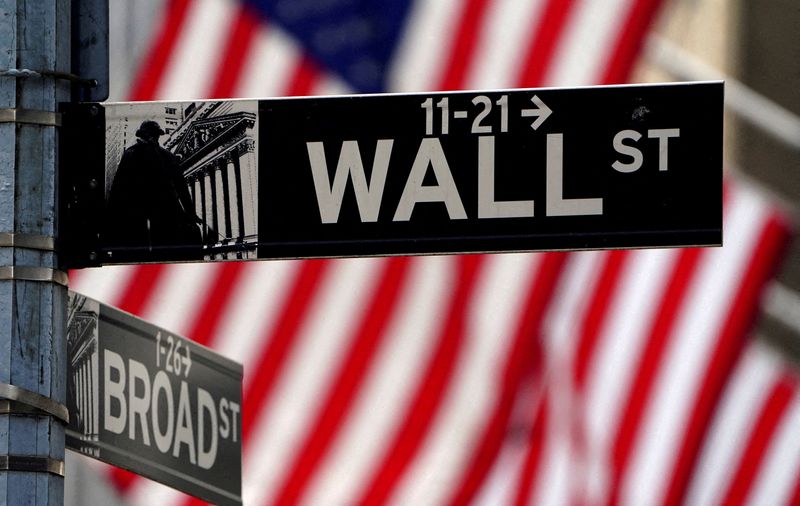A look at the day ahead in U.S. and global markets from Mike Dolan
The U.S. bond market returns from holiday to find Wall Street stocks soaring ever higher to new records, with Big Tech and Big Banks stirring earnings season excitement even as China's markets turn tail on demand worries and stimulus doubts.
The S&P 500 and the Dow Jones posting fresh record finishes, with the former rapidly homing in on 6,000 after a 22% rise for the year so far and the Dow closing above 43,000 for the first time.
With Taiwan's giant chipmaker TSMC, the main producer of advanced chips used in artificial intelligence applications, expected to report a 40% leap in third-quarter earnings on Thursday and Europe's ASML (AS:ASML) reporting tomorrow, Tech stocks led the latest leg higher.
The semiconductor index jumped 1.8% to a more than two-month high on Monday - aided by the 6.8% advance by Arm and a 2.4% surge in market heavyweight Nvidia to its best ever close. That lifted Nvidia's market value to $3.39 trillion - just shy of Apple (NASDAQ:AAPL)'s $3.52 trillion and above Microsoft (NASDAQ:MSFT)'s $3.12 trillion.
The Nasdaq is now back within 1% of the record high it set in July.
But attention will flip back to financials on Tuesday, with Bank of America (NYSE:BAC), Goldman Sachs (NYSE:GS), Citigroup and State Street (NYSE:STT) reporting alongside pharma giant Johnson & Johnson (NYSE:JNJ).
The first blush of bank results on Friday saw that sector's shares surge and estimates of annual profit growth for financials have doubled to 4% since the start of the month.
Overall, forecasts for the annual S&P500 earnings expansion in Q3 are for dip this quarter to 5%, with the biggest drag from energy and materials. But the ebullience is all about an expected quick return to double-digit growth for the index in the next quarter and right through next year.
And there's little in the robust economic news to make investors reconsider that idea.
Bank of America's latest monthly fund manager survey showed global investor optimism and equity allocations recorded the biggest jumps this month since June 2020. Cash allocations dropped to 3.9% while equity exposure rose to a net 31% overweight - and bond allocations suffered a record drop to a net 15% underweight.
With stock index futures marginally off ahead of Tuesday's bell, the biggest drag remained energy stocks - with oil prices falling anew.
U.S. crude slid as much as $4 to near two-week lows below $70 per barrel on the back of a weaker global demand outlook due to struggling China and after a media report said Israel is willing not to strike Iranian oil targets, easing fears of a major supply disruption.
The world oil market is heading for a sizeable surplus in the new year, the International Energy Agency said on Tuesday.
The annual decline in crude oil prices is running at more than 20% again - a balm for the returning Treasury market that's been so recently agitated by sticky U.S. inflation readouts.
The dollar stepped back a touch as a result, although the euro remained on the back foot ahead of the widely expected European Central Bank interest rate cut on Thursday.
But China's markets suffered again on Tuesday, reflecting concern about domestic demand in the world's second biggest economy - with persistent doubts that a recent burst of policy stimulus can get across a property-led slide in growth.
A brewing trade war with Europe and geopolitical tensions surrounding China's war games around Taiwan this week and the upcoming U.S. election all dampen any optimism there.
The Shanghai Composite slumped 2.5% in heavy trading into Tuesday's close there, while the blue-chip CSI300 lost 2.7%. Hong Kong's Hang Seng dropped 3.7% and the offshore yuan skidded to a one-month low.
A report from Caixin Global that China may raise an additional 6 trillion yuan ($850 billion) over three years to fund ongoing stimulus seemed to have little effect and investors say they want to hear more detail soon.
Elsewhere, sterling perked up even after news that British pay grew at its slowest pace in more than two years in the three months to August and with vacancies falling again.
And in European earnings, Ericsson (BS:ERICAs) shares jumped 8% after the Swedish company reported third-quarter sales above expectations as demand for 5G gear rebounded in North America.
Key developments that should provide more direction to U.S. markets later on Tuesday:
* US corporate earnings: Bank of America, Goldman Sachs, Citigroup, State Street, PNC, Progressive, Charles Schwab (NYSE:SCHW), Omnicom, Johnson & Johnson, Walgreens Boots Alliance (NASDAQ:WBA), Unitedhealth, United Airlines, JB Hunt (NASDAQ:JBHT) etc
* New York Fed September manufacturing survey, NY Fed Oct survey of consumer inflation expectations; Canada Sept CPI inflation

* Federal Reserve Board Governor Adriana Kugler, San Francisco Fed President Mary Daly and Atlanta Fed chief Raphael Bostic all speak. European Central Bank President Christine Lagarde speaks
* US Treasury sells 3-, 6-month bills
(By Mike Dolan; Editing by Peter Graff; mike.dolan@thomsonreuters.com)